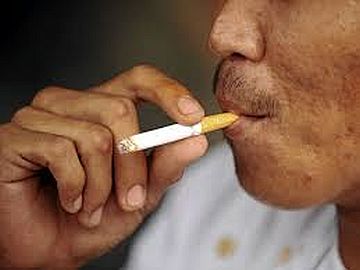
A Cebu business leader says another increase in excise tax on tobacco and liquor will affect the sales volume of these products. /Inquirer file photo
CEBU CITY, Philippines — Another round of sin taxes would result in lower volume sales of tobacco and liquor products.
Robert Go, president of Philippine Retailers Association Cebu chapter (PRA-Cebu), recalled that volume sales of the two products went down considerably when the first sin taxes were imposed.
Before the government implemented the first round of sin taxes in 2015, the sales volume of liquor and cigarettes account for closer to 10 percent of total retail sales volume. But the sales volume of these products dropped considerably although it recovered slightly after a few months. Presently, liquor and cigarette sales volume account for between six to seven percent.
“The sales (volume) of liquor and cigarette drastically went down because of the sin taxes,” said Go when asked what was the impact when the first sin tax was imposed.
While the sales volume recovered slightly on the latter part of the year, it did not return the original sales volume recorded before the implementation of the sin taxes, he added.
For example, the sales of Mighty cigarettes have experienced a drop in sales volume because the Japanese company that had acquired it increased the prices, Go pointed out.
President to certify sin tax bill as urgent
President Duterte had agreed to certify as urgent the bill of Senator Manny Pacquiao increasing taxes on tobacco and liquor, according to the Presidential Spokesman.
Senate Bill Number 1599, seeking to amend Republic Act 10351 or the Sin Tax Reform Act of 2012, increases the current unitary excise tax rate to P60 per pack from P30 per pack, and the annual excise tax to nine percent from four percent.
On the other hand, the Lower House had approved on third and final reading House Bill 8677 on tobacco excise taxes and HB 8618 on alcohol taxes in December last year.
HB 8677 seeks to increase the tax on every cigarette pack from the current P32.50 to P37.50 in July 2019. It would go up further by P2.50 per pack every year from 2020 to 2022, and by another four percent annually in the succeeding years.
HB 8618, on the other hand, aims to raise the tax on beer and other fermented liquors from the current P23.50 per liter to P28 per liter starting in January, to P32 in 2020, P34 in 2021, and P36 in 2022.
Health Secretary Francisco Duque said the revenue generated by the additional sin taxes would be used to fund the Universal Health Care program, which would need P257 billion in the first year of implementation.
Health officials also hoped that the higher taxes on cigarettes would discourage smoking among Filipinos.
Number of Filipino adult smokers remain high
The National Survey to Monitor the Impact of the Sin Tax Law conducted in 2015 by the Social Weather Station and commissioned by the Department of Health found that four out of five or 82.3 percent of smokers reported that the number of cigarettes they smoked decreased because of the increased price.
Also, seven out of ten smokers or 69.4 percent considered quitting smoking, and almost the same percentage of respondents 63.8 percent attempted to quit smoking.
Two out of five smokers or 39.4 percent switched to a cheaper brand while 37.5 percent simply resorted to asking others for cigarettes.
However, the number of adult Filipinos who smoked remained high with one out of four or 16.5 million adults admitted to be smokers.
Also, the survey found that the average cigarette expenditure per month increased from P336.30 in 2009 to P678.40 in 2015.
“Overall, and across all demographic characteristics such as sex, age, residence and selected educational levels, cigarette expenditures per month among manufactured cigarette smokers significantly increased,” the survey found./dbs